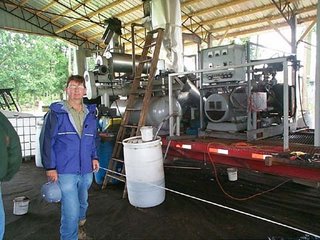 Agricultural researchers are determined to help solve the energy shortages the industrial world is experiencing. Previously I posted on University of Illinois Urb/Champ researchers who developed a process to produce crude oil from pig manure. Now researchers from Iowa State University are mixing corn stalks and cow manure to produce oil and charcoal.
Agricultural researchers are determined to help solve the energy shortages the industrial world is experiencing. Previously I posted on University of Illinois Urb/Champ researchers who developed a process to produce crude oil from pig manure. Now researchers from Iowa State University are mixing corn stalks and cow manure to produce oil and charcoal.The researchers are working to take wastes from Iowa farms -- manure and corn stalks -- and turn them into a bio-oil that could be used for boiler fuel and perhaps transportation fuel.Source.
"The way I see manure, it's not waste anymore," Sadaka said. "It is bio-oil."
But it takes a few steps to make that transformation.
First, the manure needs to be dried so it can be burned. Sadaka's idea for low-cost and low-odor drying is to mix the manure with corn stalks, put the mix in a big drum, use a small blower to keep the air circulating and use an auger to turn the mixture once a day. Within about five days, bacteria and fungi working to decompose the mix have naturally raised the temperature to about 150 degrees Fahrenheit. Within another 20 days or so the moisture content is down from 60 percent to about 20 percent. Sadaka calls the process bio-drying.
That makes it possible to move to the next step: rapidly heating the mixture in a bubbling, fluidized bed reactor that has no oxygen. It's a process called fast pyrolysis. The process thermochemically breaks the molecular bonds in the mixture. It produces charcoal that can be used to enrich soil. And it produces vapors that are condensed to a thick, dark bio-oil.
Preliminary tests indicate every kilogram of dried mixture produces .2 to .5 kilograms of bio-oil depending on the operating conditions.
Sadaka said the energy content of dry manure is 12 to 18 gigajoules per ton. Canada's Office of Energy Efficiency says one gigajoule of electricity will keep a 60-watt bulb continuously burning for six months. Sadaka figures if half the animal manure in the country were processed into bio-oil, that would produce the equivalent of 45 million tons of oil.
Sadaka is experimenting with the process in 900-liter drums at the Iowa Energy Center's Biomass Energy Conversion Center in Nevada. So far, he has dried a mixture of cow manure and corn stalks. Next he'll test the process with poultry manure. And then he'll try pig manure.
This process is similar to other processes used to make oil from poultry process waste. Here is more information on the process from the US Government renewable energy program.
These processes are attempts to utilise more of the byproducts of agriculture in producing renewable energy. Growing animals for food is inherently wasteful when viewed in perspective, but there are ways of making it more efficient than it is. Here is a fine overview from Mechanical Engineering Magazine, discussing this family of technologies and their application to farm waste.
Besides thermolyis and thermal depolymerisation to produce oil, manure can produce methane to substitute for natural gas. Corn stubble and rice, wheat, barley etc. straw can be broken down to sugars and fermented to make ethanol or butanol, and the methane from manure used as fuel to distill the resulting "beer" to pure ethanol.
Researchers in agricultural sciences simply do not want to be left out of the action, when it comes to solving the renewable energy problem. There seems to be enough glory to go around, even for manure research.
No comments:
Post a Comment